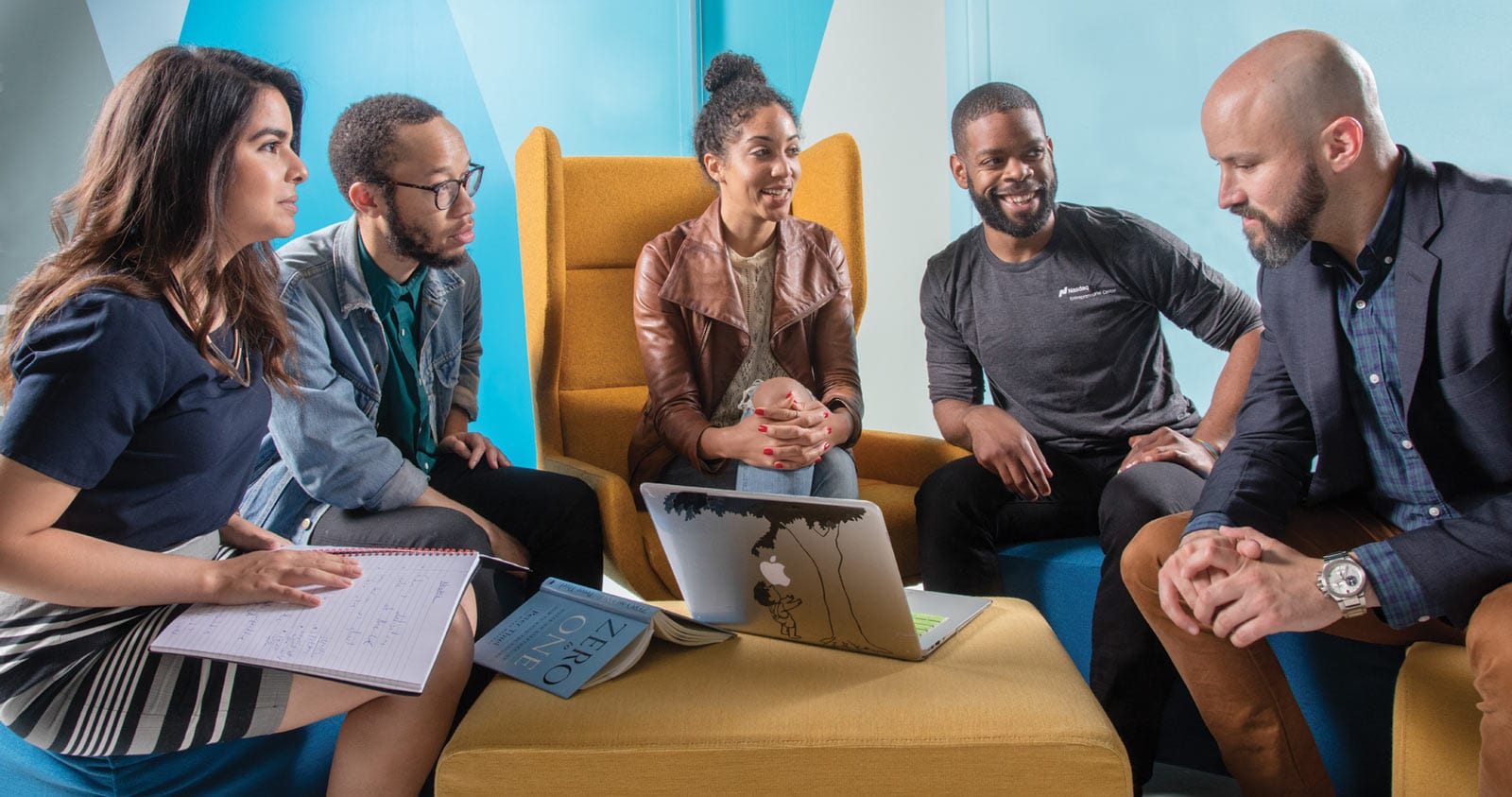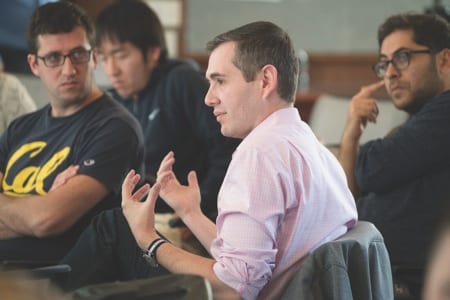
Innovative students. Seasoned, entrepreneurial faculty. Fledgling businesses on the lookout for legal services. Ladies and gentlemen of the law: Start your engines.
By Linda Peterson
It started with a yearning to scratch the entrepreneurial itch, a symptom usually associated with Silicon Valley. High-achieving students, savvy faculty, and alumni with startup or venture capital credibility helped Berkeley Law bring the goods to San Francisco and the East Bay.
Today, school-supported innovation is blooming in new businesses like Indiegogo, the largest global crowd- funding site; Magoosh, a growing outlet for online test prep; and RealtyShares, an innovative online portal for real estate investment. The school also helped launch entrepreneurship-for-social-good companies such as Noora Health, which pioneers family involvement in hospital patient care; and Alterna Foundation, which introduces new health-related technologies into developing countries. Students in Berkeley Law’s New Business Practicum provided creative legal help when each of the nascent startups was operating on a shoestring.

“Now these businesses have grown to the level of affording the heftier fees most transactional attorneys charge,” says Bill Kell, director of the program, “and that’s part of the plan.”
Hoping to facilitate many more such partnerships—and to exploit notable geographic shifts in the technology landscape—the school last year created Startup@BerkeleyLaw, an umbrella for all business startup work across the law school. The initiative trains Berkeley Law students to help startups succeed, guides new business ventures as they navigate tricky legal and organizational issues, and o ers entrepreneurs access to top experts, courses, and workshops.
“We train students for practice with the involvement of firms like Cooley, Wilson Sonsini, Gunderson Dettmer, and Orrick, so they become informed advisors, not technocrats,’’ says former startup attorney Adam Sterling ’13, now executive director of the Berkeley Center for Law and Business (BCLB). “We provide legal education and services to startups on campus. And we connect UC Berkeley with Silicon Valley.”
Each startup has a business model, but all share Berkeley Law’s philosophy that innovation thrives when lawyers are involved at an early stage. A joint initiative of BCLB and the school’s Berkeley Center for Law & Technology (BCLT), Startup@BerkeleyLaw signals what BCLB faculty co-director Robert Bartlett calls “a determined effort to confrm our position as the country’s leading law school for aspiring startup lawyers.”
Building on Connections
Startup@BerkeleyLaw is a natural outgrowth of the school’s already strong business law program, including its established—and well-regarded—connections to the startup community.
Sterling, who co-chaired UC Berkeley’s annual campuswide startup competition as a JD/MBA student, focuses on entrepreneurship. Bartlett, whose prior practice concentrated on advising startups, leads the way in securities. BCLB faculty co-director Steven Davido Solomon, who writes “The Deal Professor” column each week for The New York Times, practiced for approximately a decade as a mergers and acquisitions attorney in the United States and Europe.
Since 2007, the New Business Practicum—the nation’s leading interdisciplinary transactional clinic—has trained students in assisting Bay Area and Central Valley startups. The school also offers broad outreach in Silicon Valley and Asia; expanded training opportunities in mergers and acquisitions, venture capital (VC), and related issues; collaboration with other campus programs; and expertise in intellectual property (IP) and related elds such as public policy, business, science, and technology.
Although Silicon Valley is more often associated with entrepreneurship, Sterling says Startup@BerkeleyLaw affords powerful advantages—especially as lofty Peninsula and San Francisco real estate prices drive startup business across the bay. “Our immersion in the extended UC Berkeley community makes us the law school within a hub of innovation. At the same time, Silicon Valley’s energy is rapidly overflowing into our area,” he says, citing as an example the rehab of a former uptown Oakland Sears store into a tech center.
Bartlett notes that “the center of gravity for startups has moved to San Francisco’s South of Market district, just a short BART trip from campus, and it’s drifting closer.” Today, Berkeley’s 10 incubator workspaces overflow with entrepreneurs who stayed local after graduating from the university, or were otherwise attracted to the city’s creative environment.

For example, 500 Startups founding partner Christine Tsai, a Berkeley undergrad alumna, co-leads one of the world’s top accelerators and seed funds. Their startups now number more than 1,300, with big hits like Grab, which uses smartphone technology to e-hail taxis in six Asian countries, and Credit Karma, which provides credit tools and education via the Web and mobile devices.
Then there’s the attraction of Berkeley’s rich history in social justice and social entrepreneurship, and the relative ease of making connections in the East Bay startup world. “The traditional geographies within Silicon Valley are more crowded spaces,” Sterling says. “VCs get more bang for their buck by collaborating with Berkeley.”
Lawyers as Problem-solvers
Startup@BerkeleyLaw’s versatile programs prepare students to guide founders on a course that acknowledges the shifting entrepreneurial and legal landscapes. Today, business lawyers—once characterized as deal-makers or deal-breakers—must be viewed as problem-solvers, says professor Justin McCrary.
“There are zillions of issues entrepreneurs encounter—from getting payroll going to determining whether to issue multiple share classes as they incorporate,” says McCrary, who directs the university’s Social Science Data Laboratory. “Lawyers need to offer solutions in order to provide the highest-value service if they’re going to avoid having their work commoditized.”
McCrary believes big data and predictive analytics that yield more information more quickly have changed the way people assess legal concerns and trends.
“Lawsuits against Uber and Lyft were based on allegations that their drivers are employees, not contractors,” he says. “Those suits helped me realize that students need to better understand agency law principles. And students absolutely relate. They see how what they learn in the classroom connects to what’s in the news.”
Sterling, too, observes how and where students learn— and from whom. In February, he and his colleagues launched FORM+FUND, a monthly program featuring legal workshops, pro bono attorney office hours for the extended Berkeley startup community, and insider advice from experts.
“Law schools do a good job teaching doctrinal law, but what was so helpful to me was gaining practical experi- ence and the opportunity to work with a client,” says Virginia Scholtes ’16, who helped on a medical device project through the Berkeley IP Lab. Created last year, the lab—a seminar/practicum hybrid—assists local early-stage startups on IP issues.

For Bartlett, the quality of Berkeley Law students and alumni fuels many engines. “Given our location, it’s no surprise that so many gravitate to the startup world,” he says. “That’s where you see the raw material of true lead-ership.” Look anywhere, urges Bartlett—general counsels of technology companies, chief operating officers of top VC rms, leaders of the big startup law firms—and you’ll find Berkeley Law alums. “They’re brilliant, hardworking, and innovative,” he says.
With Startup@BerkeleyLaw, Davidoff Solomon says, “We leverage the power of place and people, equipping law students to steward successful entrepreneurial out- comes—whatever model those startups follow.”
Like Flying a Kite or Driving a Car?
The most established piece of the Startup@BerkeleyLaw ecosystem is the New Business Practicum, which unites entrepreneurs who need affordable early-stage legal advice with law students hungry for meaningful experience.
Berkeley Law and Haas Business School students work together to address the many legal challenges involved in launching a business—including forming legal entities, managing risks, and building key relation-ships with workers, investors, and consumers. The Practicum has provided individual help to more than 250 startups and led group-training sessions for another 250.
Kell juxtaposes the romanticized American dream of starting a business with harsh U.S. Small Business Administration data showing that half of all startups fold within five years.
“We’d like to think that entrepreneurship is like flying a kite—all you need is a vision, paper, and string—and if at first it doesn’t fly, just try again.” The reality, he explains, is more like driving a car. “Entrepreneurship is difficult, and while society recognizes that new drivers need support when they’re just starting out, few start- ups can afford the legal guidance needed to safely manage the risks.” When entrepreneurs crash, “people get hurt—families lose savings, credit ratings are ruined, and communities lose jobs.”
The Practicum and Startup@BerkeleyLaw demonstrate how much Berkeley Law students can help change those survivability statistics. By their second year, they have already acquired a foundational understanding of the legal challenges new businesses face.
Putting that knowledge to work, while supervised by faculty and alums, helps students become the creative, con dent practitioners entrepreneurs need. “We train law students to be diagnostic,” Kell says, “vetting business plans, anticipating legal issues, and showing patience as entrepreneurs find the model that works.”
